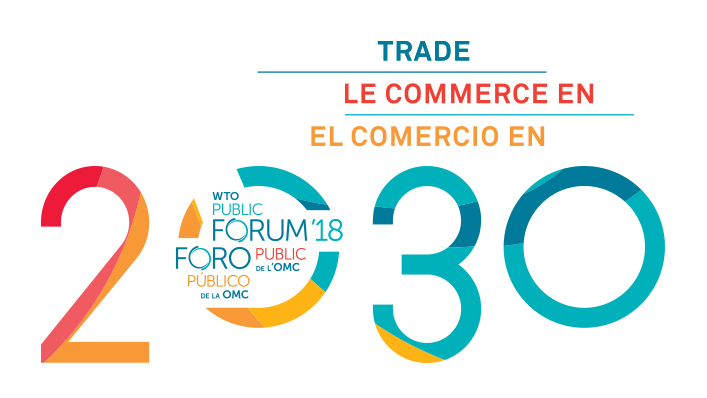Shaping an intelligent tech and trade initiative: ITTI driving aI-trade interactions to boost global prosperity
3 Oct 2018 02:00h
Event report
Chaired by Mr Marcos Troyjo (Director, BRICLab Columbia University), the panel discussed options to better equip trade negotiators to represent their countries’ interests and level the global playing field at various trade negotiation tables. It explored opportunities for trade curators to interact with technology leaders for the development of trade-related artificial intelligence (AI tools). In particular, the panel discussed the Cognitive Trade Advisor (CTA), a new tool in the area of AI-powered tools for (trade) negotiations that comes out of the work of the Intelligent Tech & Trade Initiative (ITT).
Mr Daniel Feffer (Chairman, ICC Brazil) emphasised that developing countries still face inequalities at trade negotiation tables. Since increased trade means increased prosperity, it is crucial that these countries step-up their efforts and that other countries intensify their efforts to support them. Feffer argued that if we are observing the advances in AI, and in particular the contributions that IBM Watson, an AI platform, was able to make in the field of medicine, we also need to wonder how AI can support the work of negotiators, especially in the field of trade. Feffer described how the CTA was developed as a prototype. IBM Watson was taught to ‘read’ trade agreements and to be able to answer queries from trade negotiators. The intention is that trade negotiators can save time on research and spend more time on building the agreements. With this kind of augmented intelligence, Feffer argued, better trade deals and win-win solutions have become more achievable.
Mr Bonapas Onguglo (Head of Trade, Analysis Branch, UNCTAD) argued that it is important to encourage the UN to use new technologies. He pointed out that trade and technology are a catalyst for the sustainable development goals (SDGs) and that AI needs to be explored in this context in particular, as far as it allows developing countries to benefit. Countries need a permanent supporting mechanism for trade negotiations in order to level the playing field when financial and human capacities are insufficient. Trade negotiators in particular face the challenge of having to be aware of a vast amount of technical details within complex agreements that can often span more than a thousand pages. Similarly, the institutional memory of past negotiations needs to be preserved in cases where negotiators often change. AI can be a factor in addressing these challenges.
Ms Ana Lizano (Counsellor, Permanent Mission of Costa Rica to the WTO) brought her perspective as a negotiator to the table. In terms of trade negotiations, she observed a fast evolution and continuous disruptions by technologies such as blockchain and AI. She argued that new technology can play a big role in finding better trade agreements, automating ports and borders, reducing shipping costs, and increasing bilateral trade. In terms of negotiation support, AI-powered tools, she argued, can present suggestions and scenarios to enable humans to make better decisions. She also raised potential points for consideration, such as preserving the knowledge of experienced negotiators, engaging in meaningful public private partnerships, and designing new tools collaboratively and making them available to the wider WTO-membership.
Ms Julia Seiermann (Associate Economic Affairs Officer, UNCTAD) emphasised the need for levelling the playing field between developed and developing countries, and to work towards greater equality. Technology can help with this, but there is also the danger of exacerbating existing inequalities. There is a need to address the lack of resources, especially on the side of small and developing countries. The CTA could save resources and enable a more productive use of existing ones for trade negotiators and countries. The key, according to Seiermann, will be to make the technology and the data available to everyone and to tackle areas where data is lacking. Lastly, Seiermann emphasised that it will be up to humans, not machines, to decide which outcomes – such as trade, economy, or tackling inequalities – should be the main focus.
Mr Gabriel Petrus (Executive Director, ICC Brazil) argued that technology can build trust in the multilateral system of trade negotiations by addressing the lack of transparency (through public and open source tools). It can help in the reform of the WTO and enable a new kind of trade negotiation. The CTA is a tool that uses advances in AI to increase the productivity of trade negotiators. Petrus pointed out that the tool is useful in helping negotiators prepare better, building better strategies, and saving time in preparation and research for the negotiations. At the moment, the CTA focuses on so-called ‘rules of origins’ in the trade treaties, but there are plans to extend the tools to other areas with high relevance for trade negotiations. Petrus also stressed that the tool is ultimately always shaped by human intelligence.
Additional comments provided by Ms Lucia Maduro focused on the need for modernising the rules of origin within MERCUSOR. She argued that the CTA can be a useful tool in tackling the challenge of complexity and to ultimately develop a new model for rules of origin in trade treaties. Ms Sandra Rios pointed out that the benefits of the tool need to be clear, as well as the ambitions with regard to the scope of the tool. She emphasised that the tool itself does not provide results, but that it can help in levelling the playing field. Mr Nikolaus Schultze stressed that the CTA can be a big help for developing countries with smaller negotiation teams.
Questions raised during Q&A included: Who controls the data and who owns the data? Is the source code publicly available? Given that there is a fundamental problem with trust in algorithmic decision-making, does this make the tool potentially untrustworthy or unreliable?
Related topics
Related event

